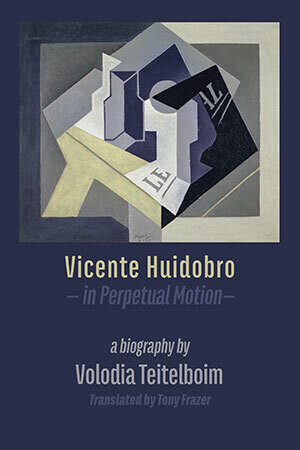Shearsman Store
Teitelboim, Volodia
Volodia Teitelboim Volosky (1916–2008) was a Chilean communist politician, lawyer, and author. Born in Chillán to Jewish immigrants (Moisés Teitelboim, from Ukraine, and Sara Volosky, from Bessarabia), Teitelboim was interested in literature from an early age. He finished high school, then began his studies in the Faculty of Law of the University of Chile. At the age of 29, Teitelboim married Raquel Weitzmann, who had also studied law.
In the 1940s, while Teitelboim, like other members of the Communist Party, was forced to go underground, Weitzman became pregnant with the child of a former university colleague. The child, named Claudio, was adopted by Teitelboim and Weitzman's affair was hushed up. Due to Teitelmboim's frequent long periods of absence due to party activities, persecution, and imprisonment, the marriage suffered, and finally ended in 1957, when Weitzman left for Cuba together with Jaime Barros. Teitelboim then took charge of Claudio, who was then 10 years old. When, in 2005, Claudio learned that he had been deceived and that his father was actually the lawyer Álvaro Bunster, he broke relations with Teitelboim and took on his biological father's surname.
In 1967, Teitelboim married Eliana Farías. Together, while in exile in Moscow following the Chilean military coup d'état of September 11, 1973, they raised Faría's son, Roberto Nordenflycht, and their own daughter, Marina. Roberto also became a communist, and was killed in August 1989 while taking part in a guerrilla action in Chile with the Manuel Rodríguez Patriotic Front. The grief over Roberto's death marked the end of Teitelboim's marriage to Farías. His daughter Marina eventually became a diplomat.
During the military regime of Gen. Augusto Pinochet Teitelboim lived in exile in Moscow, where he launched the twice-weekly radio program Escucha, Chile ("Listen, Chile"). Despite the risk, he clandestinely returned to Chile in 1988 and campaigned for a provisional government following the regime's having been handed a defeat in that year's national plebiscite. The following year he was elected president of the Communist Party, a position he held until 1994. Teitelboim died in 2008 of kidney failure resulting from lymphatic cancer.
Teitelboim's literary work, for which he was awarded Chile's National Prize in Literature in 2002, as well as the Literature prize of the 1931 Floral Games, is chiefly in the form of memoirs, biographies, and literary essays. His first book Antología de poesía chilena ( Anthology of Chilean Poetry ) was published in conjunction with Eduardo Anguita in 1932, and compiled the great poets of Chile. He would later say that it committed an error by omitting Gabriela Mistral and accentuating the dispute between Vicente Huidobro, Pablo de Rokha, and Pablo Neruda. His series of memoirs, Un muchacho del siglo XX ( A Boy of the Twentieth Century, 1997), La gran guerra de Chile y otra que nunca existió ( The Great War of Chile and Another That Never Existed, 2000) and Noches de radio ( Radio Nights, 2001) present from a political and social perspective the great span of Chilean history during the 20th century. His best known role is that of a biographer, in which he wrote about Jorge Luis Borges, Vicente Huidobro, and with the most critical acclaim, Pablo Neruda and Gabriela Mistral. In terms of membership in literary movements, he is generally classified with the Chilean Generation of '38.



